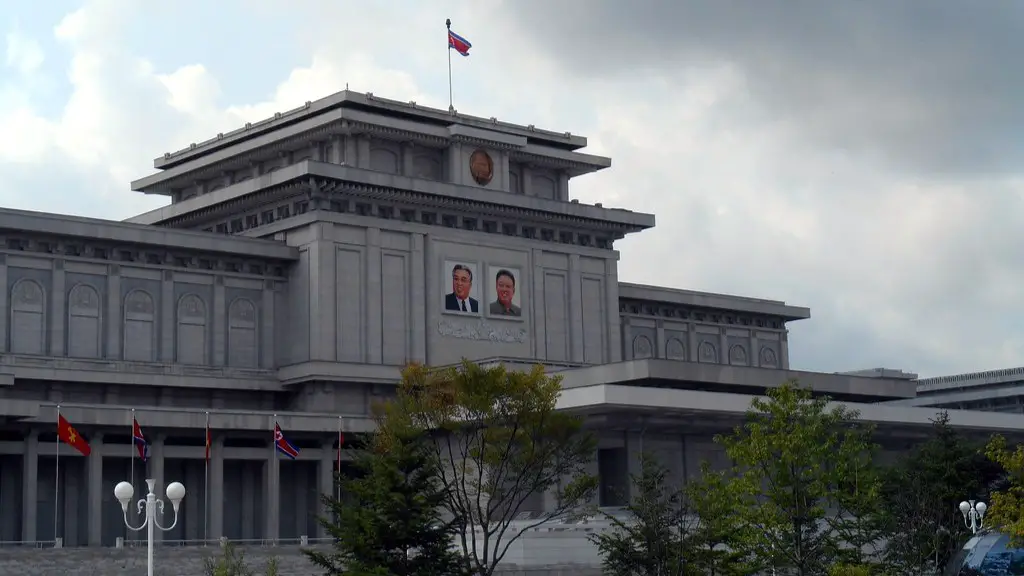Part 1: North Korea Situation
North Korea is one of the world’s most isolated and repressive countries. A recent upsurge in tensions between the North and its neighbors in the region and the United States has highlighted the need for a comprehensive strategy to address the North Korean crisis. As the recent military build-up by North Korea has accelerated, leading to more missile and nuclear tests, the United States and its allies must consider what immediate steps can be taken to address the situation.
To understand how best to approach the issue, context is key. North Korea has been a source of concern for decades, as it is one of the few countries in the world to still maintain a nuclear weapons program. In spite of years of international sanctions and diplomatic efforts, the country has continued to make advances in its nuclear arsenal and delivery systems. Moreover, it is a country with a long history of human rights violations, and its government has been implicated in numerous illegal activities.
The current situation with North Korea is one of great uncertainty. There are several international diplomatic initiatives in process and numerous stakeholders involved, who have each laid out their own positions and proposed ways to solve the crisis. US Secretary of State Rex Tillerson has put forward his own strategy, which calls for diplomatic and economic pressure on North Korea to denuclearize. In practice, however, it is unclear whether this approach is likely to bear fruit and whether North Korea will comply with such demands.
At the same time, there are concerns that the current crisis can lead to a regional conflict, with either North Korea or its adversaries potentially launching a military attack. Given the regional and global implications of such a conflict, it is essential that all stakeholders involved take a cautious and deliberate approach to the situation.
Part 2: Engaging North Korea
A key element of any strategy for addressing the North Korean crisis must involve direct dialogue and engagement. Engaging North Korea in talks to resolve the crisis is essential if there is to be any chance of de-escalating the situation and potentially denuclearizing the Korean Peninsula.
There are several organizations and initiatives that have been established to facilitate dialogue between North Korea and its neighbors. The six-party talks, composed of North and South Korea, China, Japan, Russia, and the United States, have been ongoing since 2003 and have produced some results, though have not seen much real progress over the past several years. In addition, the UN’s top envoy to North Korea, special envoy Nick Cummins, was recently in Pyongyang to discuss the possibility of re-engaging in the six-party talks.
The key question, however, is whether direct engagement and dialogue is likely to have an impact on North Korea’s behavior. While the risk of a military conflict is real, the primary concern should be that a prolonged standoff can result in a nuclear arms race in the region, as other countries like Japan and South Korea begin to develop their own nuclear weapons.
In order to prevent this from happening, the United States and its allies must be willing to engage North Korea in direct negotiations and consider possible incentives for denuclearization. One option that has been discussed is the implementation of a diplomatic “freeze for freeze” agreement, wherein the US and its allies would agree to suspend their military exercises and other activities in exchange for North Korea halting its missile and nuclear tests.
Part 3: US Sanctions
In addition to dialogue and engagement, the US and its allies must consider the use of economic sanctions as a way to pressure North Korea into complying with the international community’s demands. Sanctions are seen as one of the most effective forms of economic pressure, and the US has used them in the past to great effect.
The primary tool for implementing sanctions is the UN Security Council, which is responsible for establishing and enforcing a wide range of economic sanctions against North Korea. This includes measures such as freezing global assets and trade bans. The US has also imposed its own unilateral sanctions, such as cutting off US companies and individuals from doing business with North Korea.
Sanctions are generally seen as effective because they can be used to deny North Korea access to resources, technologies and funding that are critical to its weapons development. However, there is the risk that North Korea may be able to find alternative means of acquiring these resources. Moreover, there is concern that too strict of sanctions could further destabilize an already fragile economy, leading to greater instability and an even higher risk of conflict.
Part 4: US Military Approach
Despite the focus on diplomacy and economic sanctions, the US and its allies must also consider the military option for addressing the situation with North Korea. While direct military action is considered a last resort, the US has recently made it clear that it is taking a hard line approach to North Korea, with President Trump emphasizing that “all options are on the table” in dealing with the country.
The US has a long history of using military force to achieve its foreign policy goals, and this is the primary tool at its disposal when it comes to dealing with North Korea. Recent military exercises by the US and its allies, such as the deployment of strategic bombers to the region, are seen as a warning to North Korea that the US is willing to use military force in the event of an attack.
The US and its allies must consider carefully the potential implications of taking a military approach to the North Korean crisis. While the US has a highly capable military, a conflict with North Korea could have devastating and far-reaching consequences, both regionally and globally. Moreover, there is the risk of civilian casualties and the potential for a wider regional conflict.
Part 5: Regional Cooperation
Any strategy for dealing with the North Korean crisis must involve regional cooperation and coordination. In particular, the regional countries most involved in the crisis, such as South Korea and Japan, must be included in discussions and negotiations. Additionally, China must be involved as part of any diplomatic and economic strategy, as it is North Korea’s biggest trading partner and a key influencer in the region.
By leveraging the resources and capabilities of the regional countries, the US and its allies would be in a better position to pressure North Korea and potentially get it to comply with international demands. This cooperation must be based on mutual trust and respect, and should include direct consultations between the countries.
Ultimately, it is important to recognize that no single country can solve the North Korean crisis alone. If a lasting and stable solution is to be achieved, it will require a coordinated effort from the US and its allies, as well as respect for all of the involved stakeholders.
Part 6: International Support
Finally, any strategy for addressing the North Korean crisis must involve strong international support and agreement. The US and its allies must be able to garner support from the international community and seek to build a consensus around their proposals. This is essential if they are to have any chance of persuading North Korea to comply with their demands.
The United Nations has been at the forefront of this effort, with numerous resolutions and statements issued in recent months calling on North Korea to denuclearize. The international community has also been generous in providing humanitarian aid and assistance to the country in spite of its refusal to comply with international demands.
The most effective way to ensure strong international support is by working in partnership with the UN and other likeminded countries. This is essential if the US and its allies are to succeed in getting North Korea to denuclearize and cease its missile tests.
Part 7: Human Rights Abuses
Any strategy for dealing with the North Korean crisis must also include measures to address the country’s egregious human rights abuses. North Korea is regarded as having one of the worst human rights records in the world, and has been implicated in numerous grave violations, such as the torture and summary execution of political dissidents.
The US and its allies must take this into account in their negotiations and outreach efforts. Freeing political prisoners, allowing the UN to monitor living conditions in the country, and providing access to humanitarian aid and assistance are all essential components of any long-term strategy for dealing with North Korea.
At the same time, it is essential to keep in mind that any effort to address human rights violations must be done in such a way that it is consistent with broader efforts to resolve the nuclear crisis. The US and its allies must be careful not to make human rights a bargaining chip in their negotiations, but instead use them as a way to build trust between the two sides.
Part 8: Conclusion
The situation with North Korea is a complicated and multi-faceted one, and any strategy for addressing it must be comprehensive and involve all of the stakeholders involved. The US and its allies must be ready to use a combination of diplomacy, economic sanctions and the threat of military action to pressure North Korea into complying with international demands. This must be done in the context of strong regional and international cooperation, and with consideration for the country’s egregious human rights violations.
Only by taking a comprehensive and respectful approach to the North Korean crisis can the US and its allies hope to achieve a lasting and stable solution.


